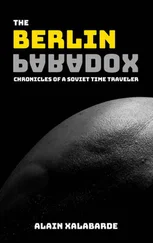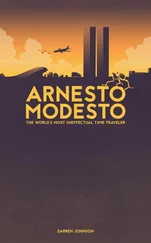James Gleick - Time Travel
Здесь есть возможность читать онлайн «James Gleick - Time Travel» — ознакомительный отрывок электронной книги совершенно бесплатно, а после прочтения отрывка купить полную версию. В некоторых случаях можно слушать аудио, скачать через торрент в формате fb2 и присутствует краткое содержание. Год выпуска: 2016, Издательство: Knopf Doubleday Publishing Group, Жанр: Старинная литература, на английском языке. Описание произведения, (предисловие) а так же отзывы посетителей доступны на портале библиотеки ЛибКат.
- Название:Time Travel
- Автор:
- Издательство:Knopf Doubleday Publishing Group
- Жанр:
- Год:2016
- ISBN:нет данных
- Рейтинг книги:5 / 5. Голосов: 1
-
Избранное:Добавить в избранное
- Отзывы:
-
Ваша оценка:
- 100
- 1
- 2
- 3
- 4
- 5
Time Travel: краткое содержание, описание и аннотация
Предлагаем к чтению аннотацию, описание, краткое содержание или предисловие (зависит от того, что написал сам автор книги «Time Travel»). Если вы не нашли необходимую информацию о книге — напишите в комментариях, мы постараемся отыскать её.
Time Travel — читать онлайн ознакомительный отрывок
Ниже представлен текст книги, разбитый по страницам. Система сохранения места последней прочитанной страницы, позволяет с удобством читать онлайн бесплатно книгу «Time Travel», без необходимости каждый раз заново искать на чём Вы остановились. Поставьте закладку, и сможете в любой момент перейти на страницу, на которой закончили чтение.
Интервал:
Закладка:
*6 He also proposed a few “don’ts,” including, “Don’t make your professor, if you have one, talk like a military policeman or an Eighth Avenue ‘cop.’ Don’t put cheap jokes in his mouth. Read semi-technical magazines and reports of speeches to get the flavor of academic phraseology.”
*7 An editor’s note explained: “Stories of traveling in time are always exceedingly interesting reading, mainly for the reason that the feat has not yet been accomplished; though no one can say that it cannot be done in the future, when we have reached a much higher plane of scientific achievement. Traveling in time, either forward or backward, may well become a possibility.”
FOUR
Ancient Light
“Time is a mental concept,” said Pringle. “They looked for time everywhere else before they located it in the human mind. They thought it was a fourth dimension. You remember Einstein.”
—Clifford D. Simak (1951)
BEFORE WE HAVE clocks we experience time as fluid, mercurial, and inconstant. Pre-Newtonians did not assume that time was a universal, trustworthy, absolute affair. Time was well known to be relative—to use that word in its psychological sense, not to be confused with the newer sense that came into being circa 1905. Time travels in divers paces with divers persons . *1Clocks reified time and then Newton made time…let’s say, official. He made it an essential part of science: time t, a factor to be plugged into equations. Newton regarded time as part of the “sensorium of God.” His view is handed down to us as if engraved on tablets of stone:
Absolute, true, and mathematical time, in and of itself and of its own nature, without reference to anything external, flows uniformly…
The cosmic clock ticks invisibly and inexorably, everywhere the same. Absolute time is God’s time. This was Newton’s credo. He had no evidence for it, and his clocks were rubbish compared to ours.
It may be, that there is no such thing as an equable motion, whereby time may be accurately measured. All motions may be accelerated and retarded, but the flowing of absolute time is not liable to any change.
Besides religious conviction, Newton was motivated by mathematical necessity: he needed absolute time, as he needed absolute space, in order to define his terms and express his laws. Motion is defined as the change in place over time; acceleration is the change in velocity over time. With a backdrop of absolute, true, and mathematical time, he could build an entire cosmology, a System of the World. This was an abstraction; a convenience; a framework for calculating. But for Newton it was also a statement about the world. You may believe it, or not. *2
Albert Einstein believed it. Up to a point.
He believed in an edifice of laws and computation that had grown from a bare stone church into a grand ornate cathedral, supported by colonnades and flying buttresses, layered with carving and tracery—work still in progress, with hidden crypts and ruined chapels. In this edifice time t played an indispensable part. No one could grasp the whole structure, but Einstein understood more than most and had encountered a problem. There was an internal contradiction. The great achievement of the last century’s physics was James Clerk Maxwell’s unification of electricity, magnetism, and light—the achievement that was so visibly wiring the whole world. Electric currents, magnetic fields, radio waves, and light waves were one and the same. Maxwell’s equations made it possible to calculate the speed of light, for the first time. But they were not meshing perfectly with the laws of mechanics. Those light waves, for example—so clearly waves, according to the mathematics, but waves in what ? Sound needs air or water or other substance to carry the vibrations. Light waves likewise implied an unseen medium, the so-called ether—“luminiferous,” or light bearing. Naturally experimentalists were trying to detect this ether, with no success. Albert Michelson and Edward Morley came up with a clever experiment in 1887 to measure the difference between the speed of light in the direction of the earth’s motion and the speed of light at right angles to it. They couldn’t find any difference at all. Was the ether necessary? Or was it possible to think purely of an electrodynamics of moving bodies, through empty space?
We know now that the speed of light in empty space is constant, 299,792,458 meters per second. No rocket ship can overtake a flash of light or reduce that number in the slightest. Einstein struggled (“psychic tension”; “all sorts of nervous conflicts”) to make sense of that: to discard the luminiferous ether, to accept the speed of light as absolute. Something else had to give. On a fine bright day in Bern (as he told the story later), he talked it over with his friend Michele Besso. “Next day I came back to him again and said to him, without even saying hello, ‘Thank you. I’ve completely solved the problem.’ An analysis of the concept of time was my solution. ” If light speed is absolute, then time itself cannot be. We must abandon our faith in perfect simultaneity: the assumption that two events can be said to happen at the same time. Multiple observers experience their own present moments. “Time cannot be absolutely defined,” said Einstein—it can be defined, but not absolutely —“and there is an inseparable relation between time and signal velocity.”
The signal carries information. Suppose six sprinters line up at the start line for the hundred-meter run, with their hands and one knee touching the ground and their feet in the starting blocks, awaiting the sound of the gun. The signal velocity in this case will be about a few hundred meters per second, the speed of sound through air. That’s slow nowadays, so Olympic events have scrapped starting pistols in favor of signals wired (at light speed) into loudspeakers. To think about simultaneity more carefully, it becomes necessary also to consider the signal velocity of light traveling to the eyes of the runners, the judges, and the spectators. In the end, there is no one instant, no “point in time,” that can be the same for everyone.
Suppose lightning strikes a railway embankment (trains are more usual than horses in these stories) at two different points, distant from each other. Can you—a physicist, with the most excellent modern equipment—establish whether the two flashes were simultaneous? You cannot. It turns out that a physicist riding the train will disagree with a physicist standing at the station. Every observer owns a reference frame, and each reference frame has its own clock. There is no one cosmic clock, no clock of God or Newton.
The revelation is that we can share no now —no universal present moment. But was that altogether a surprise? Before Einstein was born, John Henry Newman, poet and priest, wrote that “time is not a common property; / But what is long is short, and swift is slow/And near is distant, as received and grasped / By this mind and by that, / And every one is standard of his own chronology.” For him it was intuitive.
“Your now is not my now,” wrote Charles Lamb in England to his friend Barron Field in Australia, the far side of the earth, in 1817, “your then is not my then; but my now may be your then, and vice versa. Whose head is competent to these things?”
Nowadays we are all competent to these things. We have time zones. We can contemplate the International Date Line, where an imaginary boundary divides Tuesday from Wednesday. *3Even when we suffer from jet lag—the quintessential disease of time travel—we are shrewd in our suffering and can nod wisely at William Gibson’s account of “soul delay”:
Her mortal soul is leagues behind her, being reeled in on some ghostly umbilical down the vanished wake of the plane that brought her here, hundreds of thousands of feet above the Atlantic. Souls can’t move that quickly, and are left behind, and must be awaited, upon arrival, like lost luggage.
Читать дальшеИнтервал:
Закладка:
Похожие книги на «Time Travel»
Представляем Вашему вниманию похожие книги на «Time Travel» списком для выбора. Мы отобрали схожую по названию и смыслу литературу в надежде предоставить читателям больше вариантов отыскать новые, интересные, ещё непрочитанные произведения.
Обсуждение, отзывы о книге «Time Travel» и просто собственные мнения читателей. Оставьте ваши комментарии, напишите, что Вы думаете о произведении, его смысле или главных героях. Укажите что конкретно понравилось, а что нет, и почему Вы так считаете.












